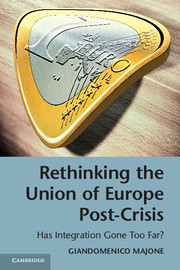Book contents
- Frontmatter
- Contents
- List of abbreviations
- Introduction: varieties of regional integration
- 1 Monetary union as a metaphor
- 2 A political culture of total optimism: its rise and fall
- 3 Integration and its modes
- 4 Deepening integration: transaction costs and socio-political limits
- 5 European integration and the decoupling of politics and economics
- 6 From the democratic deficit to a democratic default? The normative dimension of the euro crisis
- 7 ‘More Europe’
- 8 The limits of leaderless Europe
- 9 Integration through cooperative competition
- 10 The nation state between globalization and regional integration
- Bibliography
- Index
Introduction: varieties of regional integration
Published online by Cambridge University Press: 05 May 2014
- Frontmatter
- Contents
- List of abbreviations
- Introduction: varieties of regional integration
- 1 Monetary union as a metaphor
- 2 A political culture of total optimism: its rise and fall
- 3 Integration and its modes
- 4 Deepening integration: transaction costs and socio-political limits
- 5 European integration and the decoupling of politics and economics
- 6 From the democratic deficit to a democratic default? The normative dimension of the euro crisis
- 7 ‘More Europe’
- 8 The limits of leaderless Europe
- 9 Integration through cooperative competition
- 10 The nation state between globalization and regional integration
- Bibliography
- Index
Summary
Regionalism, old and new
The revival of regional integration in the 1980s – which Jagdish Bhagwati (1993) labelled the ‘Second Regionalism’, in contrast to the ‘First Regionalism’ of the 1960s – raises a number of issues, starting with the question why the first regionalism failed (with the notable exception of the European Economic Community (EEC)), while this time regionalism is likely to endure. The conversion of the United States (US) to regionalism is of major significance in this respect. As the key advocate of multilateralism through the post-war years, its decision to travel the regional integration route seems to have tilted the balance at the margin from multilateralism to regionalism. A second important factor has been the widening and deepening of the European Community/Union (EC/EU). Thus, the fear that European investments would be diverted to Eastern Europe was cited by President Salinas of Mexico as a factor decisively pushing him toward the North American Free Trade Agreement (NAFTA). He felt that a free trade area embracing all of North America would enable Mexico to get the investments needed from the US and Canada, as well as from Japan (Bhagwati 1993; Vega Cànovas 2010). In his comment on Bhagwati’s article, Robert Baldwin considered the likelihood of a gradual drift of the North American regional bloc to include a number of other Latin American countries. This enlargement would be driven by pressures from these countries to tap into the US market but another important factor that might drive the expansion of an American-centred bloc, according to Baldwin, ‘would be the growing influence of the European Community in trade, macroeconomic and foreign policy matters. US political and economic leaders may adopt the view that it is necessary to expand such a bloc in order to match the increasing political and economic power of the Community’ (Bhagwati 1993: 54).
- Type
- Chapter
- Information
- Rethinking the Union of Europe Post-CrisisHas Integration Gone Too Far?, pp. 1 - 19Publisher: Cambridge University PressPrint publication year: 2014



